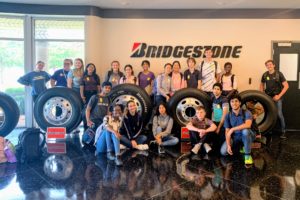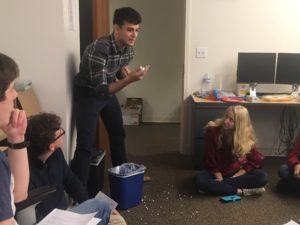Grade 11: Interdisciplinary Science III
Grade 11: Interdisciplinary Science III
Interdisciplinary Science III is a more in-depth look at scientific research that introduces students to the various outputs of scientific research, ethical implications of research, and helps prepare the students for their own research internships.
In the fall, this course focuses on weaving together several teaching series:
- Idea to “P”: This series (I2P, for short) explores the various paths an idea can

The class of 2020 visited The Bridgestone factory in La Vergne to see the chemistry, physics, and manufacturing of tires. take as it is researched and a solution is formulated. Modules include: “Idea to Publication”, “Idea to Patient” (medical/clinical applications), “Idea to Ph.D.”, “Idea to Prize”, “Idea to Patent”, and “Idea to Profit”.
- Defining your College Criteria: This series focuses on helping students explore the various options there are for higher education following high school and allow them to begin thinking about which college/university characteristics are most important to them. Modules include “Private and Public Liberal Arts Campuses”, “Staying Close to Home”, and “Attending a State University”.
- Science and Society: This series focuses on the responsibilities scientists have to ethically conduct research and involves a historical look into past practices in medical research through reading and discussing The Immortal Life of Henrietta Lacks by Rebecca Skloot.
- Lab Preparation: During the course of the fall semester, students prepare an application package for, and interview with, potential laboratory principal investigators. Instructors also have classroom and lab activities that prepare students for their internships. Finally, students submit their sophomore research projects to the Tennessee Junior Academy of Science.
In the spring semester, the course is designed for small group learning and for students to begin their laboratory internship. In the morning, students meet in small teams with their faculty advisor for journal clubs. Also, student teams rotate through three “mini-courses” to study several aspects of science and research in an interdisciplinary format. The structure of these forums encourages in-depth examination and analysis of several topics in a team-oriented setting. In the afternoon, students work in their research laboratory in preparation for their summer research internship.
- Famous Scientists: To better understand current scientific theories and principles,

In the prospectus forum about pioneers in ecology, a student explains r and k selection coined by ornithologist Robert MacArthur. it is helpful to learn about the people who proposed these ideas and their research. We explore several scientists in depth to learn about their thought processes, motivations, successes, and even failures.
- Advances in Technology: This forum offers a detailed look at the technology used in research. Students also explore the driving forces behind technological advances. We examine not only how the technology works, but how it is applied in research and how it might be utilized or improved in the future.
- Ethics in Research: Throughout history, the fields of science and mathematics have had unfortunate consequences due to mistakes, deceit, and unethical practices. We take a closer look at some of the greatest blunders and determine what lessons, if any, are to gain from such missteps.
- Journal Clubs: Students meet weekly with their advisor group for journal clubs in the third 9 weeks. These journal clubs, led by an instructor, mimic a typical research team’s meeting to discuss and analyze recent publications. Students take turns presenting a research journal article that relates to their upcoming laboratory internship for critique and discussion with a small group of their peers. In the fourth 9 weeks, students present their proposals to the class, detailing the research they plan to accomplish during the summer internship.
In the summer following 11th grade, students will participate in the Summer Research III course.
CONNECT WITH SSMV
